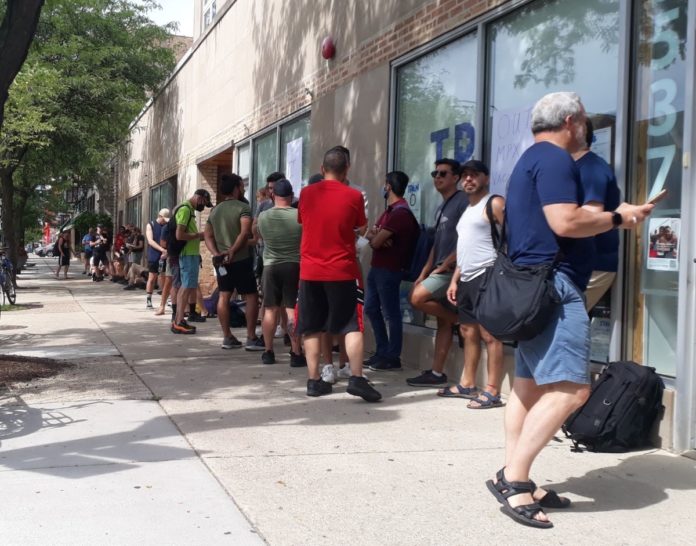
As of Tuesday, the Chicago Public Health Department has posted a partial list of vaccine distribution sites on its monkeypox information page, including several Howard Brown clinics.
TPAN has also posted a list of LGBTQ bars and clubs hosting vaccine pop-ups in Chicago, but it is not available on any city website. Most of the men in line on Monday said they had to rely on social media and word-of-mouth to find out where to go, with only one saying he had been directed to TPAN by an employee of his local city council representative’s office.
“There’s been fucking nothing from the city,” said one man, speaking anonymously, who claimed he had been waiting in line for over six hours to ensure he received one of TPAN’s 100 vaccines. “Just tell us where to get the vaccine. Tell us where to go.”
Dr. Creticos likewise believed not just the city, but Illinois could also be doing more to inform concerned individuals, particularly those who live outside the Chicagoland area.
“I’ve been asked by my patients [outside Chicago], ‘Where am I going to go?’ and I don’t always know,” Creticos said. “The state needs to do better at getting that information out there.”
Further complicating the issue is the U.S. Center for Disease Control and Prevention’s recommendation of two doses of Jynneos vaccine for full monkeypox protection. With supplies so limited, getting the first dose does not guarantee one will receive the second.
“They’re not doing second-dose schedules anywhere,” another man in the TPAN line said.
James Cole, the first to get a jab from TPAN on Monday, said he had been waiting in line since around 9 a.m. He added that he had also been turned away from the clinic last Monday after it ran out of vaccine, and that like other men in line, he found the city and state’s response to the outbreak severely lacking. Contacting his health provider as the city suggested had proven a dead end.
“Between Monday and today, I waited a whole week to get a vaccine,” Cole said. “Even calling my doctor at Northwestern [Medicine], they didn’t have any there.”
The city is aware of this criticism, and claims it is working as fast as possible to get shots into arms.
“We have received and already distributed about 5,000 – it’s about 5,400 now – vaccine does to date,” Dr. Allison Arwady, Commissioner of the Chicago Public Health Department, said during a Friday press conference. “Every vaccine that has come to Chicago has been pushed out.”
Arwady laid the blame for the lack of vaccine in Chicago on the unpreparedness of the U.S. as a whole for a monkeypox outbreak.
“Your doctor’s office, your local pharmacy does not just have monkeypox vaccine on the shelf, because in a typical year we see zero cases in the U.S., maybe one in a traveler,” Arwady said. “And so what’s called the Strategic National Stockpile at the federal level maintains vaccine. The U.S. is acquiring more, they have put in orders for millions of additional doses, but when this broke out there were only tens of thousands of doses in the whole U.S. stockpile.”
For some members of Chicago’s LGBTQ community, this was still not a sufficient explanation, and neither was it for Dr. Creticos.
“Can you imagine if this was smallpox? We’d all be dead. I wouldn’t call this ‘strategic preparedness,’” she said.
One former organizer for the Illinois Democratic Party who agreed to speak anonymously compared the outbreak to the AIDS crisis that began in the early 1980s. It was a crisis that disproportionately affected gay and bisexual men, killing thousands, but that was largely ignored by the Reagan administration until 1987.
“It’s like, we went through this before in the 80s and it didn’t go well when it was ignored. How about some foresight?” he said. “it’s ridiculous the lack of info out there.”
Gutierrez, who lived through the AIDS crisis, was hesitant to compare the initial spread of AIDS to this less severe monkeypox crisis. While over 100 people died of AIDS in the U.S. in 1981, the first year that the CDC began reporting what would become known as AIDS, no fatalities have yet been reported from the monkeypox outbreak. Creticos said this was the one lucky break in the situation so far.
“The one lucky thing about this outbreak is it’s a milder strain of monkeypox… there is a more severe strain that is more deadly,” she said.
Gutierrez instead attributed the situation to a “perfect storm” of circumstances. He pointed out that Bavarian Nordic’s main manufacturing plant in Denmark has been closed since August 2021 for a planned expansion, limiting the company’s ability to quickly manufacture more Jynneos doses. The company itself has stated that it does not expect the plant to reopen until “the third quarter of 2022” later this summer, limiting its ability to produce more doses until then.
“There’s a lot of moving parts,” he said.
Gutierrez also warned against labelling monkeypox a “gay disease.” Though the New England Journal of Health found that 98% of the cases reported between April and June were in gay and bisexual men, the World Health Organization, CDC and Creticos all emphasized that anyone can be infected under the right circumstances.
“I don’t compare monkeypox to HIV/AIDS. That was just pure hysteria,” Gutierrez said. “I mean there’s similarities, like a slow response, but… we have to be careful about calling monkeypox a ‘gay disease.’ It’s not.”
Creticos, though, said the monkeypox outbreak was “like deja vu.” She has worked with AIDS patients since 1985, and while she agreed that monkeypox should not be considered a gay disease, she said there were definite parallels between this outbreak and the start of the 1980s AIDS crisis.
“It’s similar in many ways. It’s affecting a group of people that a lot of people think, ‘should we really be spending our resources on them?’” the doctor said. “It’s a group of people that are considered disposable and some people won’t care until it affects them.”
It may affect “them” sooner than they think. Unless the virus is properly contained, Creticos warned, a breach into wider straight, cisgender society is very likely.
“It may start in the gay community but it could get out,” she said. “Once it gets out into the broader population, it’ll be nearly impossible to eradicate.”
Read the Top 8
Sign up for the Top 8, a roundup of the day’s top stories delivered directly to your inbox Monday through Friday.








